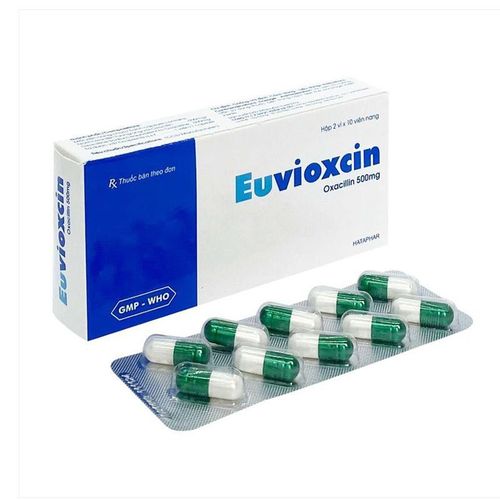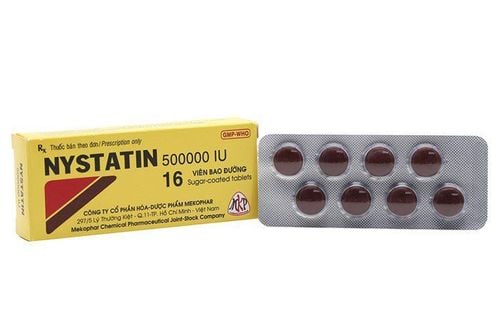This is an automatically translated article.
Fimaconazole drug belongs to the group of parasitic, anti-infective, antiviral, antifungal drugs and has the main ingredient fluconazole. The drug is indicated in the treatment of candida in the vulva, oral thrush, pharynx and esophagus. Before using Fimaconazole, patients need to carefully study and follow the treatment of their doctor.
1. Mechanism of action of the drug Fimaconazole
What is Fimaconazole? Fimaconazole belongs to the first group of novel antifungal triazoles. Fimaconazole works by inhibiting the action of the enzyme cytochrome P450-14alpha demethylase. At the same time, it also inhibits the synthesis of ergosterol belonging to the sterol mainly in the fungal cell membrane. Thereby, changing the permeability of the fungal cell membrane and releasing essential substances, and at the same time reducing the absorption of precursor molecules such as purines, pyrimidines...., into the fungal cells.2. Indications and contraindications to the use of Fimaconazole
Fimaconazole is indicated in the treatment of candidiasis of the vulva and vagina, fungi of the mouth and pharynx, esophagus, urinary tract, and peritoneum. In addition, the drug can be used to treat other serious systemic candidiasis such as candidaemia, pulmonary or disseminated candidiasis. In particular, Fimaconazole is also used in the treatment of meningitis caused by Crytococcus neoformans, fungal diseases caused by balstomyces, histoplasma, coccidioides immitits.What does Fimaconazole do? Fimaconazole is also used to prevent candida infections in immunocompromised patients, patients undergoing bone marrow transplant and undergoing chemotherapy or radiation therapy, cancer patients, and AIDS patients. However, the drug Fimaconazole may be contraindicated in cases of hypersensitivity to the components of the drug.
3. Dosage and usage of Fimaconazole
Dosage of Fimaconazole depends on the type of fungus, kidney function, and the patient's response to the drug. When treating melasma, the patient should use the drug continuously until the clinical manifestations and test results prove that the disease is cured. However, if the patient is not treated for enough time, the disease may recur.
For adults, the treatment dose for Candida infections is as follows:
Treatment of vulvovaginal candidiasis: the patient can apply a single dose of 1 tablet (150mg)/time/day. To prevent recurrence, Fimaconazole should be used at a dose of 1 tablet (150 mg) once a month for a period of 4-12 months. Treatment of oral - pharyngeal fungus: The recommended dose of Fimaconazole is 1 tablet (150mg)/time/day, for 1 to 2 weeks. Esophageal treatment: The recommended dose is to use Fimaconazole 1 tablet (150mg) once a day, for at least 3 consecutive weeks and for at least 2 more weeks after symptoms are gone. Treatment of systemic fungus: The recommended dose of Fimaconazole is to take 3 tablets on the first day, take 1 tablet (150mg) once a day on the first day, for at least 4 weeks and at least 2 weeks to continue using it. Use medication until symptoms disappear. It should be noted: The above recommended therapeutic dose for Fimaconazole is for reference only. Therefore, before using Fimaconazole, patients should be prescribed by a doctor.
If the patient using Fimaconazole medicine misses a dose, use the missed dose as soon as you remember it. However, if the interval between the missed dose of Fimaconazole and the next dose is too close, skip the missed dose. Patients should not double the dose of Fimaconazole, because it can cause an overdose. To overcome the missed dose of Fimaconazole, patients can set an alarm or ask family members to remind them.
In case the patient accidentally uses Fimaconazole drug in excess of prescribed dose and shows some dangerous symptoms such as pupil dilation, dysarthria, rapid pulse, agitation, disorientation, respiratory failure. ... then it is necessary to take the patient to a medical center for timely emergency treatment.
4. Unwanted side effects when using the drug Fimaconazole
Fimaconazole medicine can cause some unwanted side effects during treatment. However, for each patient case, Fimaconazole can cause a number of different unwanted side effects of varying degrees from mild to severe.
Some common side effects caused by Fimaconazole include: headache, dizziness, nausea and vomiting, abdominal pain, diarrhea,... These side effects may occur at the beginning of treatment or after increasing the dose of Fimaconazole. Usually, side effects from Fimaconazole can be transient or subside over time.
In some cases, Fimaconazole can cause serious unwanted side effects with rare reactions. These reactions may appear within minutes of using Fimaconazole or may be longer within a few days. When serious side effects appear, such as: transient increase in transaminases, serum bilirubin, rash, pruritus, eosinophilia, anemia, leukopenia, neutropenia, thrombocytopenia, skin If you have flaking, fever, pleural effusion .... the patient should stop using Fimaconazole and need immediate medical assistance.
In summary, Fimaconazole belongs to the group of parasitic drugs, anti-infectives, antivirals, antifungals and has the main ingredient fluconazole. The drug is indicated in the treatment of candidiasis in the vulva, oral thrush, pharynx, esophagus. Before using Fimaconazole, patients need to carefully study and follow the treatment of their doctor.
Follow Vinmec International General Hospital website to get more health, nutrition and beauty information to protect the health of yourself and your loved ones in your family.
Please dial HOTLINE for more information or register for an appointment HERE. Download MyVinmec app to make appointments faster and to manage your bookings easily.













